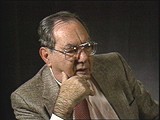You searched for: ������������������������������what���kaa2238���qgjt2cpv
<< Previous | Displaying results 181-190 of 670 for "������������������������������what���kaa2238���qgjt2cpv" | Next >>
-
Fela Warschau describes reading lists of names to find surviving family members
Oral HistoryFela was liberated at Bergen-Belsen by the British army in 1945. She went to a displaced persons (DP) camp administered by the Americans in Feldafing, near Munich. She married in the DP camp in 1946, and eventually immigrated to the United States.
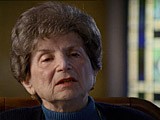
-
Lily Mazur Margules describes the dehumanization she felt in the Kaiserwald camp
Oral HistoryLily was forced into a ghetto after the Germans occupied Vilna in 1941. She was forced to work until the liquidation of the ghetto in 1943 when she was deported to the Kaiserwald camp near Riga, Latvia. From there she was sent to work in the Duenawerke labor camp. She was deported by ship across the Baltic Sea to the Stutthof camp and was taken to a nearby labor camp. Lily was liberated during a death march which ended in the town of Krumau, East Prussia, in 1945.
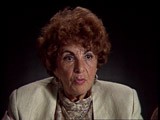
-
Wallace Witkowski describes harsh living conditions for non-Jews in Poland
Oral HistoryWallace and his family were Polish Catholics. His father was a chemical engineer and his mother a teacher. The Germans occupied Kielce in 1939. Wallace witnessed pogroms against Jews in 1942. Wallace was active in the anti-Nazi resistance, acting as a courier between partisan groups. In 1946, in liberated Poland, Wallace witnessed the Kielce pogrom. He was reunited with his father in the United States in 1949; other family members followed. The Communist regime in Poland, however, denied his only sister…
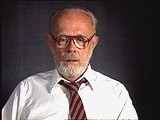
-
Siegfried Halbreich describes conditions in the Sachsenhausen camp
Oral HistoryAfter Germany invaded Poland on September 1, 1939, Siegfried fled with a friend. They attempted to get papers allowing them to go to France, but were turned over to the Germans. Siegfried was jailed, taken to Berlin, and then transported to the Sachsenhausen camp near Berlin in October 1939. He was among the first Polish Jews imprisoned in Sachsenhausen. Inmates were mistreated and made to carry out forced labor. After two years, Siegfried was deported to the Gross-Rosen concentration camp, where he was…
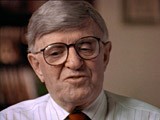
-
Johanna Gerechter Neumann describes how her family obtained visas to emigrate to Albania
Oral HistoryAmid intensifying anti-Jewish measures and the 1938 Kristallnacht ("Night of Broken Glass") pogrom, Johanna's family decided to leave Germany. They obtained visas for Albania, crossed into Italy, and sailed in 1939. They remained in Albania under the Italian occupation and, after Italy surrendered in 1943, under German occupation. The family was liberated after a battle between the Germans and Albanian partisans in December 1944.
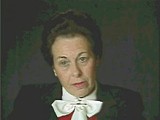
-
Hanne Hirsch Liebmann describes the effects of Kristallnacht (the "Night of Broken Glass")
Oral HistoryHanne's family owned a photographic studio. In October 1940, she and other family members were deported to the Gurs camp in southern France. In September 1941, the Children's Aid Society (OSE) rescued Hanne and she hid in a children's home in Le Chambon-sur-Lignon. Her mother perished in Auschwitz. In 1943, Hanne obtained false papers and crossed into Switzerland. She married in Geneva in 1945 and had a daughter in 1946. In 1948, she arrived in the United States.
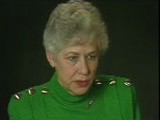
-
Helen Dreksler Zimm describes obtaining a false birth certificate
Oral HistoryHelen was the oldest of three sisters. Her father owned a soap factory. After the Germans attacked Poland in 1939, they took over all Jewish businesses. Helen and her family fled from Lodz to a town between Lodz and Warsaw. After two years, in 1942, Helen's father heard that the Jews in the town to which they had fled were to be deported to labor camps. He bought false papers for Helen and her youngest sister. All three sisters survived the war.
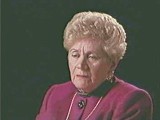
-
Rochelle Blackman Slivka describes the formation of the Vilna ghetto
Oral HistoryThe Germans occupied Vilna in June 1941. In October, Rochelle and her family were confined to the Vilna ghetto, where her mother died. Her father, a Jewish council member, was killed in a camp in Estonia. When the ghetto was liquidated in 1943, Rochelle and her sister were deported--first to the Kaiserwald camp in Latvia and later to Stutthof, near Danzig. In 1945, on the sixth week of a death march that forced the sisters to protect their bare feet with rags, the Soviet army liberated them.
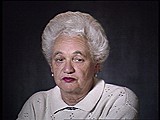
-
Samuel Gruber describes a German girl's reaction to learning that he was Jewish
Oral HistoryA Polish soldier, Samuel was wounded in action and taken by Germany as a prisoner of war. As the war continued, he and other Jewish prisoners received increasingly harsh treatment. Among the camps in which he was interned was Lublin-Lipowa, where he was among those forced to build the Majdanek concentration camp. In 1942, he escaped from the Germans, spending the rest of the war as the leader of an armed partisan group.
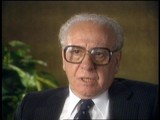
-
Abraham Lewent describes deportation to and conditions in Majdanek
Oral HistoryLike other Jews, the Lewents were confined to the Warsaw ghetto. In 1942, as Abraham hid in a crawl space, the Germans seized his mother and sisters in a raid. They perished. He was deployed for forced labor nearby, but escaped to return to his father in the ghetto. In 1943, the two were deported to Majdanek, where Abraham's father died. Abraham later was sent to Skarzysko, Buchenwald, Schlieben, Bisingen, and Dachau. US troops liberated Abraham as the Germans evacuated prisoners.
